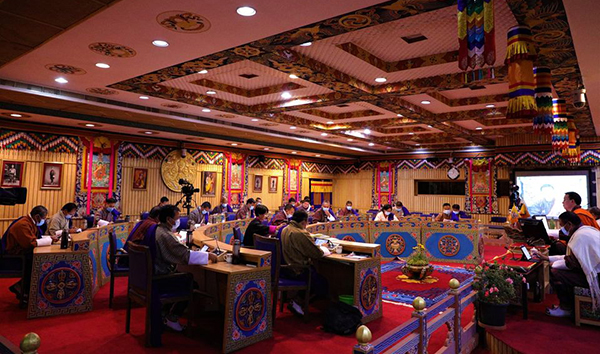
The National Council today adopted a new section under the Mines and Minerals Bill 2020 to allocate mines and minerals lease to state-owned enterprise (SOE). As of now, the mines and minerals extraction in the country is given to a private individual on lease which many parliamentarians says is against the provisions of the constitution.
The Legislative Committee, presented the Mines and Minerals Bill to the House yesterday. The committee proposed significant amendments, repeal and new insertions according to its findings. However, the section comprising of giving the lease to the SOE saw much deliberation within the member of parliaments (MP) in the House. While many approved the section, a few also opened up for the mining sector in a push for privatisation.
“The decision to give the lease to SOE is a very good decision. But still then like we discussed in section 8 states that the government should classify minerals. So if the minerals found are not strategic and if the minerals are not classified under priorities, the door should be a little open for private sectors. This way if we include the private sector in some ways, I thought it would be convenient for the government too,” the Trashigang MP, Lhatu proposed.
“I support Trashigang MP, for the country’s development there should be strong economic, and to promote economic, we should promote private sectors. And to promote the private sector, it is important for the government to give an equal business opportunity to private sectors as well,” added Tashi Samdrup, the Trongsa MP.
“We should not just think about now, we should think about the future as well. When the Bill becomes Act it should be in such a way that it can be used for many years. If private sectors can do it, we should give them an opportunity as well. Private is important, government and private should go hand in hand. See examples in foreign countries, if we need development in the country both government and private should work together. Government alone cannot do anything,” Paro MP Ugyen Tshering also added.
However, the majority of the House said that allocating mines and minerals to SOE is not nationalization but in fact granting the rights over mineral resources to every individual.
“When we say that we will give ownership to the state, it doesn’t mean that we are closing private sectors, which is not at all true. If we go through the content of the Bill, there are different topics like surface collection and quarrying, there we didn’t mention that it will really be handed over to SOEs. We all know the importance of the private sector and how they play an important role in driving the country’s economy,” said Phuntsho Rapten, an Eminent Member in the National Council.
Similarly, Eminent Member Dasho Tashi Wangyal said the allocation of mines and minerals to SOE will be convenient for everyone concerned.
“We did a study and looking at the data from 1999 to 2007, we all know that a truckload of sand from Punatshangchhu used to cost Nu 1,150 in 1999. As the years went by, the prices increased. In 2007, when it was taken over by the private sector, the cost of a truck of sand spiked to Nu 5,700 which shocked the people and concerned His Majesty. That very year, His Majesty issued a Kasho to the then National Assembly and was given the ownership to NRDCL. The price of sand was then brought down to Nu 635 thereafter. This affected the private sector but generally people across the country, and the government themselves benefitted,” added Dasho.
The decision to allocate mines and minerals to the SOEs was based on factors such as in respecting the provisions of the constitution, in recognition of the audit report of the RAA and report of the ACC among many others. The National Law Review Task Force 2018 also put up a recommendation saying that the Mines and Minerals Act 1995 must be amended particularly those provisions and rules which give mining rights to private mining companies so that there are no infractions of the constitutional provisions.
Samten Dolkar





